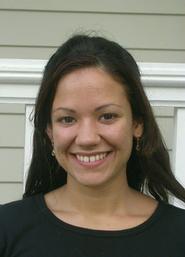
Julia Brandt '07 (Kingston, Jamaica) knows she wants to pursue a career in public health. This summer she focused on deepening her knowledge and her interest in the field. Brandt, a neuroscience major, applied for and won an Emerson grant to pursue research about pharmaceutical companies' advertisements. Advised by Professor of Biology Jinnie Garrett, Brandt analyzed the way pharmaceutical companies advertise products to physicians. "[My project] is trying to present the pharmaceutical industry as intrusive into lives of the medical public," she said.
There are two components to Brandt's research. She spent several days each week at a doctor's office in Clinton looking at the promotional items brought in by sales representatives. In one month, 37 representatives visited the office. Brandt tried to interview the representatives, but many were unwilling; after word got out that she was at the office, the numbers of sales representatives per day "dropped significantly," said Brandt. She found that the representatives who were the most polite and willing were the ones with the most experience in the field. She says the doctor has the opinion that "most reps now push their drugs; it's just about gaining profit."
In addition to her field work, Brandt analyzed pharmaceutical print advertisements in the Journal of the American Medical Association
from 1991 to 2004. She used a coding system of one to five to score the
ads. A score of one was an ad that had text only or text and scientific
imagery directly related to the project. A five coded for a completely
sensationalized ad that was developed for psychological appeal. "I
hypothesized that there would be an increase in sensationalized ads
over 14 years," said Brandt.
Her hypothesis was correct, as in 1991 a "five" ad was the least popular and in 2004 it was the third most popular.
Brandt believes these practices are unnecessary. "These drugs that are so important for people are controlled by cost. If the companies save money on [excessive] promotion, it could be used to lower the cost [of the drugs]," she explained.
Brandt plans to further her research in this area next summer. "I hope it will be continued. There is definitely room for further research," she said.
-- by Laura Trubiano '07
Posted August 25, 2005
